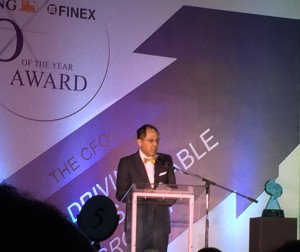
Luis Juan Oreta delivering his 8-minute acceptance speech after receiving the prestigious ING-FINEX “CFO of the Year” award
MANILA Water Co. (MWC) chief finance officer Luis Juan Oreta, the 2015 “CFO of the Year” awardee, is worried about the poor quality of water infrastructure outside Metro Manila which in turn is seen to require much larger investments than how much is actually flowing into this space.
During his acceptance speech at the ING-Financial Executives Institute of the Philippines (Finex) CFO of the Year awarding ceremony on Wednesday, Oreta noted that before joining MWC, he had seen first-hand MWC’s culture of customer centricity and excellence at work.
He said that it’s this culture that had made it possible for MWC to be “globally acknowledged as one of the most successful public-private partnership (PPP) programs, attaining world-class standards of customer service and operating efficiencies.” From 3.1 million customers with 26 percent 24/7 water availability since it took over the concession, MWC is now able to provide water to 6.3 million customers with 99 percent 24/7 water availability.
Nearly 90 percent of the water network had been replaced, leading to the reduction of non-revenue water of 63 percent in 1997 to 12 percent today. On the sanitation water side, MWC is also the leading provider of sanitation services in the Philippines, operating the largest septage treatment facility in Asia and is likewise the largest sewerage operator in the Philippines, operating the most number of sewage treatment plants (39) with the biggest treatment capacity (142 million liters per day).
“What we have achieved in Metro-Manila is the good news. The bad news is the Metro-Manila experience is far from being replicated elsewhere in the Philippines,” Oreta said.
The MWC cited World Bank estimates that only 44.4 percent of Filipinos had access to piped water. A USAID study in 2008 indicated that sanitation losses amounted to P78 billion annually with the poor very likely bearing most of these losses, he added.
“It has also been estimated that P93 billion in investments in water supply needs to be undertaken between now and 2025 although I find this estimate low given what has been programmed by Manila Water for this space,” he said.
With 10 PPPs already awarded, the government still has 45 projects in the pipeline amounting to about P949 billion but only three are water sector projects amounting to P43 billion, which Oreta said was “a rather measly sum considering what needs to be done.”
Oreta said economic growth could not be sustained without first class infrastructure. There has indeed been an increase in the number of institutional investors allocating assets to infrastructure, he said. “The problem of infrastructure finance, however, is not in raising the money but in spending it effectively. Risk and policy uncertainties have often been cited as reasons for tying up good projects thus preventing them from quickly achieving desired results,” he said.
In the case of MWC, Oreta noted that as the CFO’s challenge was to find new sources of growth, the company had since then developed several models for PPP engagements running the water value chain.
“We have in many respects become active portfolio managers of a water fund. Clearly the modern CFO’s role has changed from that of a ‘bean counter’, a rather unflattering and biased term, to that of a catalyst for ensuring that the business model evolves. In the end it is not about squeezing costs, it is all about changing the process to ensure financial sustainability,” Oreta said.
“The next way forward in managing risk and uncertainty is for the CFO is to promote a high level of corporate governance. We are viewed by the markets not just by how much the company benefits from these projects, but how society and government see us deliver the value we promise,” Oreta said.
The MWC executive noted that governance would ensure that the company would execute what it promised in a way that would be fair and economical for customers and suppliers especially in the case of water, a commodity that is socially sensitive.
“This may take the form of continuously updating corporate governance manuals and policies on related party transactions but more importantly by making good governance a part of the its corporate values and integral to its corporate culture,” Oreta said.
“A company with strong governance will deliver increased shareholder value. This is a truism I live by and is something many of you will agree with,” he said.

